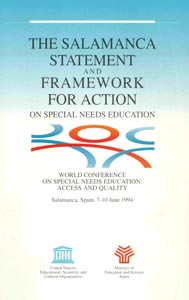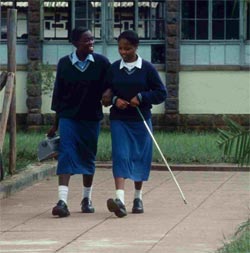Editorial: Salamanca – Ten Years On
“…we already have enough knowledge to develop schools that can be successful in educating all children. The big question is, do we have the will to make it happen?”
Mel Ainscow

The tenth anniversary of the Salamanca Statement provides us with an opportunity to consider its impact internationally. In particular, we can reflect on how, through the leadership provided by UNESCO, it has encouraged moves away from a narrow focus on the impairments of individual children, towards a much broader concept of inclusion. This is about overcoming the barriers facing all learners within education systems.
During the ten years since Salamanca, there has been considerable activity in many countries to move educational policy and practice in a more inclusive direction. There is no doubt there has been progress, although this remains very patchy, and often limited to small projects.
Progress is hampered by the widespread confusion that still exists about what ‘inclusion’ actually means. It is now well established that educational reform is particularly difficult in contexts where there is a lack of common understanding about what is intended.
The articles in this section of the newsletter illustrate the very wide range of perspectives on inclusive education, its definition and its implementation. They help to throw further light on what is meant by inclusive education. Some articles only refer to children with ‘disabilities’ or those identified as having special educational needs – which Salamanca set out to address. Others take a much broader view of inclusion and focus on all vulnerable groups of children in the particular context in which they are working – this represents the new thinking Salamanca aimed to stimulate. In particular, the articles remind us of the importance of seeing inclusion as a way of achieving Education for All, as recommended in the Salamanca Statement.
The Salamanca Statement emphasises that all learners must be catered for by education systems – if the goal of Education For All is to be achieved.
“The guiding principle that informs this Framework is that schools should accommodate all children regardless of their physical, intellectual, social and emotional, linguistic or other conditions.”
 |
 |
|
|

